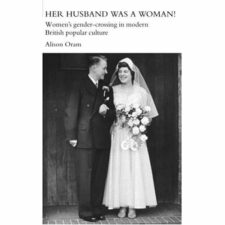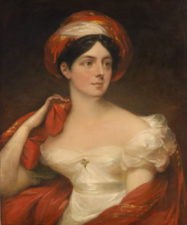I was born Edith Amelia in September 1910 in Peckham, London. As I was not born within the sound of ‘Bow Bells’ I was not a Cockney. My Grandfather, who died before I was born, was a writer-at-law at William Watlow’s of London. It was a part of family history that the Watlow carriage came regularly to collect my Grandfather, to take him to work. His caul, mounted on parchment, has been passed down through our family, and I have it now. Written in beautiful script are the words: ‘The caul of John Scutt born 15 March 1828.’ The caul is a skin over a baby’s face when it is born. In those days it was preserved, and was supposed to be lucky for mariners.
When the war began, I was four-years-old. My mother took my baby sister Elsie in a wicker pram, with me running beside it, to an air raid shelter to escape the bombs. That was the first world war, in 1914. On another occasion my father took me into the garden during a daylight raid over London, and we saw a Zeppelin go over. The guns were firing, trying to shoot it down, and I was told later that they succeeded. It went down at Silvertown, just outside the city.
Our family grew to seven children, with me as the eldest. I had one brother and five sisters. Hilda died at five-years-of-age, of the measles. In 1922 my Grandmother died, and the twins were born We grew up in a large and happy family. I won a trade scholarship at 12-years-old, but left school at 14 to help my mother bring up the children. I won my scholarship with cookery. I was taught to cook by my mother: she was a good teacher.
My mother’s hands were full. For many years she was unwell, although she didn’t show it. She died of cancer at 42-years-of-age, when I was 16. I had been looking after her and the children until our doctor put her into hospital. She lived for one month after that, and it was heartbreaking for me. I had lost my mum, my best pal. But I loved my sisters and brother, and that helped me through.
Not long after, my father gave me the ultimatum of putting them in an orphanage or me raising my siblings. My thoughts were that my mother had us, and dad wanted to get rid of us. I took the only alternative: I had a family of my own. My mother’s sisters often said they were sorry for me. But there was no help from them. I grew up with my siblings as my children. We had a big house, and I knew I could manage. I did.
One night I saw a bright star in the sky and showed the children. We all agreed it was mum looking down at us. Her grave was her flower garden, which we tended when we could go to the cemetery. Money in those days was scarce. My dad was not wont to help out, but we managed.
The family grew up. I was getting older. Sister Gladys hurt her spine and was put in an orthopaedic hospital at 10-years-of-age. She was dependent on a spinal carriage for two years. The hospital was 20 miles away and I travelled by bus and train to see her. Some Sundays my dad went by motorbike to visit. My sister Elsie, four years younger than I, was able to help, looking after the children in my absence. I left the dinner cooked for them.
There were no holidays, but it was picnics in the park for us, when the weather grew warm. I put Mabel and Grace in the twin pram when they were little, and packed in Bill who was a year older, together with the food, then it was off to the park. It took an hour to walk to Peckham Rye Park, but it was worth it.
Chicken pox were followed by measles and whooping cough, but the children (and I) came through it. I felt a sense of accomplishment as they reached maturity: I had done what I aimed at, with love and understanding.
In 1934 I met Henry Webb, who owned a grocery business nearby. We had a lot in common. His parents were dead, his mother dying when he was a teenager. He was raised by his aunt and uncle, who also brought up his sister and brother. Henry’s brother was in the army, but Henry followed his uncle, joining the navy during the first world war.
My father, not wanting to lose me, objected to our friendship. Henry was 10 years older than I. But Henry got to know the children and we created a family together: the twins were 10 at that time, Bill was 11 and Elsie and Gladys had already begun paidwork. When we went out, the twins came too.
Henry ran the grocery store for nine months or so, then returned to sea, sailing on the liners that travelled to Australia, calling in at Hobart to pick up apples. We wrote to one another during the four month periods it took to get to Australia and back.
In 1938 I began work at the business in Tooting, London SW, a grocery and provision store where we set ourselves up when Henry left the sea that year. I had grown older. The children had grown up. I wanted a life of my own.
In September 1939 the second world war began. With the blackout and air raids, travelling to and fro between Peckham and Tooting was traumatic. So, in October 1939 Henry and I decided to marry. My step-sister, a cousin and friend as well, was married on 1 October that year. (My dad had married my aunt after the war.) We chose 29 October.
It was to be a quiet weddding, but the girls were up in arms. They wanted to be bridesmaids and we said: ‘Why not?’ We married at St Giles Cathedral, Camberwell. It was a white wedding after all, with three bridesmaids. My father gave me away.
I married a man who was my friend and whom I loved dearly . We went home to Tooting that night in the rain, on a train and then the underground. When we arrived at the other end, Tooting Broadway, we had to stay in the underground because there was an air raid. But the all-clear soon sounded and we walked home, only to find that our dog had gnawed up one of my new shoes. Paddy was forgiven, and married life began with a laugh.
Edith Amelia Webb (c) 1995
Edith Amelia Webb was born in the United Kingdom on 26 September 1910, married in 1939, and emigrated to Australia with her husband Henry Webb in 1950. She took up residence in West Hobart in the house she and Henry Webb bought upon their arrival in Tasmania. She wrote this short autobiography in 1995.
‘Travelling Together – Then Alone’ is an extract from an article of the same title published in Glorious Age – Growing Older Gloriously, Artemis Publishing, Australia, 1996 (compiled and edited by Jocelynne A. Scutt).

